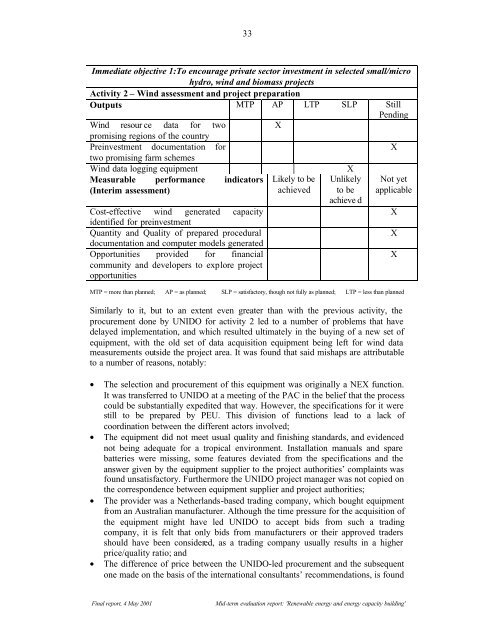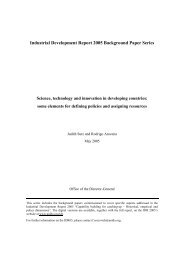Mid-term Evaluation Report Sri Lanka - Unido
Mid-term Evaluation Report Sri Lanka - Unido
Mid-term Evaluation Report Sri Lanka - Unido
Create successful ePaper yourself
Turn your PDF publications into a flip-book with our unique Google optimized e-Paper software.
33<br />
Immediate objective 1:To encourage private sector investment in selected small/micro<br />
hydro, wind and biomass projects<br />
Activity 2 – Wind assessment and project preparation<br />
Outputs MTP AP LTP SLP Still<br />
Pending<br />
Wind resour ce data for two<br />
X<br />
promising regions of the country<br />
Preinvestment documentation for<br />
X<br />
two promising farm schemes<br />
Wind data logging equipment<br />
Measurable performance indicators<br />
(Interim assessment)<br />
Cost-effective wind generated capacity<br />
identified for preinvestment<br />
Quantity and Quality of prepared procedural<br />
documentation and computer models generated<br />
Opportunities provided for financial<br />
community and developers to explore project<br />
opportunities<br />
Likely to be<br />
achieved<br />
X<br />
Unlikely<br />
to be<br />
achieve d<br />
Not yet<br />
applicable<br />
MTP = more than planned; AP = as planned; SLP = satisfactory, though not fully as planned; LTP = less than planned<br />
Similarly to it, but to an extent even greater than with the previous activity, the<br />
procurement done by UNIDO for activity 2 led to a number of problems that have<br />
delayed implementation, and which resulted ultimately in the buying of a new set of<br />
equipment, with the old set of data acquisition equipment being left for wind data<br />
measurements outside the project area. It was found that said mishaps are attributable<br />
to a number of reasons, notably:<br />
• The selection and procurement of this equipment was originally a NEX function.<br />
It was transferred to UNIDO at a meeting of the PAC in the belief that the process<br />
could be substantially expedited that way. However, the specifications for it were<br />
still to be prepared by PEU. This division of functions lead to a lack of<br />
coordination between the different actors involved;<br />
• The equipment did not meet usual quality and finishing standards, and evidenced<br />
not being adequate for a tropical environment. Installation manuals and spare<br />
batteries were missing, some features deviated from the specifications and the<br />
answer given by the equipment supplier to the project authorities’ complaints was<br />
found unsatisfactory. Furthermore the UNIDO project manager was not copied on<br />
the correspondence between equipment supplier and project authorities;<br />
• The provider was a Netherlands-based trading company, which bought equipment<br />
from an Australian manufacturer. Although the time pressure for the acquisition of<br />
the equipment might have led UNIDO to accept bids from such a trading<br />
company, it is felt that only bids from manufacturers or their approved traders<br />
should have been considered, as a trading company usually results in a higher<br />
price/quality ratio; and<br />
• The difference of price between the UNIDO-led procurement and the subsequent<br />
one made on the basis of the international consultants’ recommendations, is found<br />
X<br />
X<br />
X<br />
Final report, 4 May 2001<br />
<strong>Mid</strong>-<strong>term</strong> evaluation report: 'Renewable energy and energy capacity building'
















